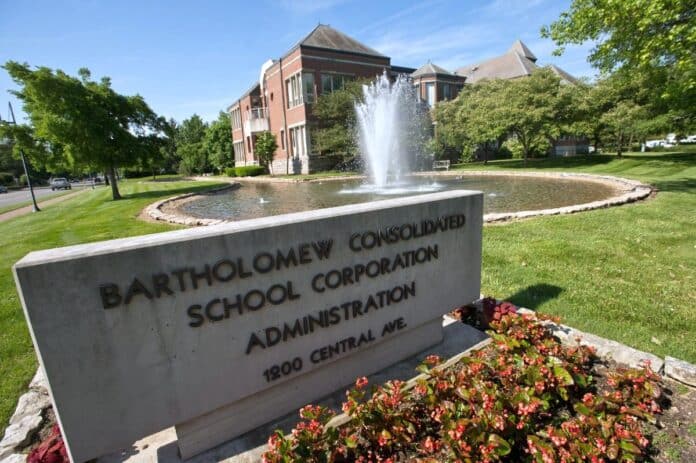
COLUMBUS, Ind. — Candidates seeking a seat on the Bartholomew Consolidated School Corp. board answered a wide range of questions about their views including how board members should engage with staff and community members, during a virtual public forum sponsored by local teachers.
Monday night’s forum was hosted by the Columbus Educators Association with logistical support from the Indiana State Teachers Association. Registration to view the event live was limited to the first 1,000 attendees, but the CEA plans to upload a recording of the event on its social media accounts.
There are candidates for three BCSC school board seats on the fall election ballot, including:
- District 3 – James Persinger (incumbent), Todd Grimes, Mike Jamerson
- District 5 – Jennifer Corsi (incumbent Pat Bryant is running for re-election but did not participate in the forum due to a family emergency.)
- District 7 – Nicole Wheeldon, Lacretia Ulery (School board president and District 7 incumbent Jeff Caldwell is not running for re-election and did not participate in the forum.)
During the forum, candidates answered 10 questions gathered from submissions by teachers belonging to the CEA, in addition to making opening and closing remarks.
One of the questions addressed a controversial BCSC policy which has been interpreted by school corporation teachers to mean that all communication between school employees and school board members must go through the superintendent. According to the question asked of candidates, the policy goes as far as outlining how students, school staff and school board member may speak to each other if they happen to bump into each other in public.
Candidates were asked if BCSC school employees should be allowed to communicate with school board members, and whether, as a school board member, would they support revising or eliminating the policy.
Grimes said that the board needs to examine the policy, discuss it and revise it “to meet current needs.” He also said that there need to be “open, honest communication lines.”
Jamerson said that in his experience working on local, regional and national boards, there are always policies for how employees can voice their concerns, and these policies always go through the “chief administrator” (in this case, the superintendent).
“There are some issues that I would consider redoing, but I think it’s always important to welcome discussions about pedagogy, technology, new models of instruction,” he said. “However, those discussions can’t be about personnel issues or workplace issues, because those need to follow established policies and procedures to ensure that individuals are treated fairly and that the issues are resolved.”
Persinger said that he and Bryant are working on changing the policy and that he hopes to do so before the end of 2020. Persinger said that he has submitted a proposal to eliminate sections of the policy and is working on rewriting another section of it.
Corsi expressed a desire to revise the policy but also noted that staff’s requests to board members should be “reasonable.”
“Use that time to speak to the board members wisely,” she said. “What are the things that are going to be key to then increase the satisfaction that you have as a teacher and increase your effectiveness as a teacher?”
Wheeldon said that enacting disciplinary measures as result of a mere conversation seemed “harsh.”
“I think a revision of it makes total sense,” she said. “… However, I do think that with a voice comes an obligation to be part of the solution.”
She also said that there needs to be a structure and process in place for communication.
Ulery said that she believes in the chain of command and that, typically, individual school principals have the knowledge to address most issues that come from their staff. In the event they are not able to do so, the conversation then moves up the chain of command.
“As a board member, I understand the need for me to be a part of the policy-making, as the board has no authority for administrative actions,” she said. “… But if this policy needs to be reviewed and language be refreshed, then that should happen. I would hope that there could be more open communication agreed to in the future.”
For more on this story, see Thursday’s Republic.




